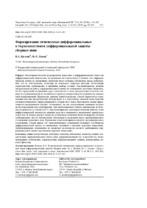Формирование мгновенных дифференциальных и тормозных токов дифференциальной защиты сборных шин
Another Title
Formation of Instantaneous Differential and Restraining Currents for Differential Protection of Busbar Assemblies
Bibliographic entry
Каченя, В. С. Формирование мгновенных дифференциальных и тормозных токов дифференциальной защиты сборных шин = Formation of Instantaneous Differential and Restraining Currents for Differential Protection of Busbar Assemblies / В. С. Каченя, М. С. Ломан // Энергетика. Известия высших учебных заведений и энергетических объединений СНГ. – 2020. – № 5. – С. 411-422.
Abstract
Рассмотрены способы формирования тормозных и дифференциальных токов для дифференциальной защиты шин, их преимущества и недостатки. Отмечено, что дифференциальная защита по мгновенным значениям имеет меньшее собственное время срабатывания, чем по действующим, поскольку не использует цифровые фильтры. Исследованы характеристика срабатывания и принципы выбора уставок. Проанализировано влияние дискретизации на работу дифференциальной защиты по мгновенным значениям. Выявлено, что без применения специальных мер в зависимости от шага дискретизации и частоты сигнала ток срабатывания будет колебаться в пределах математической погрешности, вызываемой дискретизацией. Предложено решение данной проблемы. Способ заключается в применении кусочно-квадратической интерполяции и в определении значений точек перегиба сигналов мгновенного дифференциального и тормозного токов. Произведена оценка эффективности предложенного способа. Установлено, что его использование уменьшает погрешность определения тока срабатывания. Для синусоидального сигнала максимально возможная погрешность составила 0,02 %. Проанализированы траектории движения рабочих точек дифференциальной защиты при внешнем коротком замыкании с насыщением трансформаторов тока. В данном режиме защита по мгновенным значениям более подвержена ложным срабатываниям, чем по действующим. Рассмотрен и исследован метод экспоненциального сглаживания тормозного тока. Предложен и проанализирован алгоритм экспоненциального сглаживания. Сделан вывод, что экспоненциальное сглаживание повышает устойчивость дифференциальной защиты по мгновенным значениям к внешним коротким замыканиям. Экспоненциальное сглаживание не исключает возможность ложного срабатывания дифференциальной защиты при внешних коротких замыканиях.
Abstract in another language
The methods of forming differential and restraining currents for busbar differential protection are reviewed; their advantages and disadvantages are considered. It is noted that differential protection according to instantaneous values has a shorter proper response time than for current ones, since it does not use digital filters. The response characteristic and principles of setting selection are studied. The effect of sampling on the operation of differential protection according to instantaneous values is analyzed. It was found that without the use of special measures, depending on the sampling step and the frequency of the signal, the response current would fluctuate within the mathematical error caused by sampling. A solution to this problem has been proposed. The method consists in applying piecewise quadratic interpolation and determining the values of inflection points of instantaneous differential and restraining current signals. The efficiency of the proposed method has been evaluated. It was found that its use reduces the error in determining the response current. For a sinusoidal signal, the maximum possible error was 0.02 %. The trajectories of operating point s of differential protection in case of external fault with saturation of current transformers have been analyzed. In this mode, protection for instantaneous values is more susceptible to false positives than for active ones. The method of exponential smoothing of the restraining current was considered and investigated. An exponential smoothing algorithm has been proposed and analyzed. It is concluded that exponential smoothing increases the stability of the differential protection according to instantaneous values to external faults. Exponential smoothing does not exclude the possibility of false positive of differential protection in case of external fault.
View/
Collections
- № 5[7]

